What Are API Discovery Tools?
API discovery tools are software solutions used to identify and catalog APIs within large networked environments. They help organizations manage their API ecosystems by providing visibility into APIs that are otherwise hard to track due to their volume, diversity, and decentralized governance. This visibility is crucial for security, compliance, and management purposes, enabling businesses to understand and control how their APIs are used and exposed.
These tools automate the process of scanning network segments to detect API traffic. Through deep packet inspection or similar methodologies, they analyze metadata, payloads, and communication patterns to identify APIs, making it easier for companies to manage their APIs and maintain inventory across different platforms and environments.
This is part of a series of articles about API security.
Key Features of API Discovery Solutions
Automated Discovery
Automated discovery is a core feature of API discovery tools. It uses scanning technologies to continuously monitor network traffic for signs of API activity. These tools can detect both public and private APIs, ensuring that all endpoints are accounted for. Automated discovery not only saves time but also reduces the likelihood of human error in manually cataloging APIs.
Additionally, this feature supports the dynamic nature of modern IT environments where APIs are frequently created, updated, or retired. By automatically identifying and recording new or changed APIs, organizations can keep their API inventories up to date with minimal effort.
Version Tracking
Version tracking helps in managing different versions of APIs that a company might deploy over time. This feature records changes and can alert administrators to deprecated APIs or versions that need updates, which is crucial for maintaining system integrity and compliance.
By tracking API versions, companies can ensure backward compatibility and minimize disruptions caused by API changes. It also facilitates smoother upgrades and transitions between different API versions by providing clear insights into the ecosystem’s version landscape.
Usage Analytics
Usage analytics provided by API discovery tools enable organizations to understand how their APIs are being used. This includes metrics on who is accessing the API, the frequency of access, data transfer amounts, and more. This information is vital for optimizing API performance and capacity planning.
These analytics also help in identifying unusual or unauthorized API calls, which could indicate a security breach. By understanding usage patterns, companies can improve security postures and response strategies to potential threats.
Dependency Mapping
Dependency mapping is crucial for understanding the relationships between various APIs and the applications that rely on them. API discovery tools create detailed maps of these dependencies, which are invaluable for troubleshooting and impact analysis when changes are made to an API.
With dependency mapping, organizations can assess the potential ripple effects of modifying or retiring an API. This ensures that all dependencies are considered before implementing changes, thus avoiding disruptions in service and application functionality.
Related content: Read our guide to API security tools.

2024 State of Web Application Security Testing
Are you confident your web application security measures are keeping pace with evolving threats?
Discover how your web app security compares. Learn about average testing frequency, the prevalence of web application security incidents and breaches, and the increasing adoption of automation to improve testing efficiency.
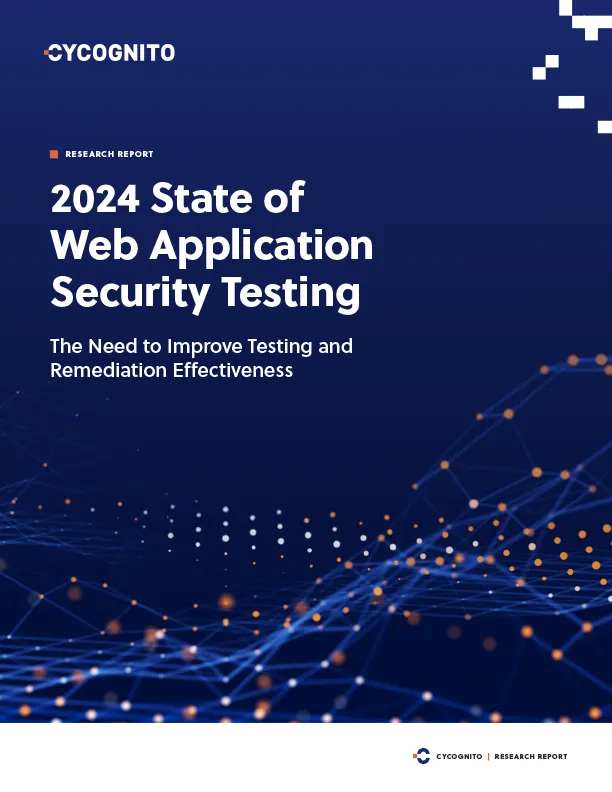
Notable API Security Tools
We’ll review several popular API management tools, which also provide API discovery capabilities.
1. MuleSoft API Management Platform
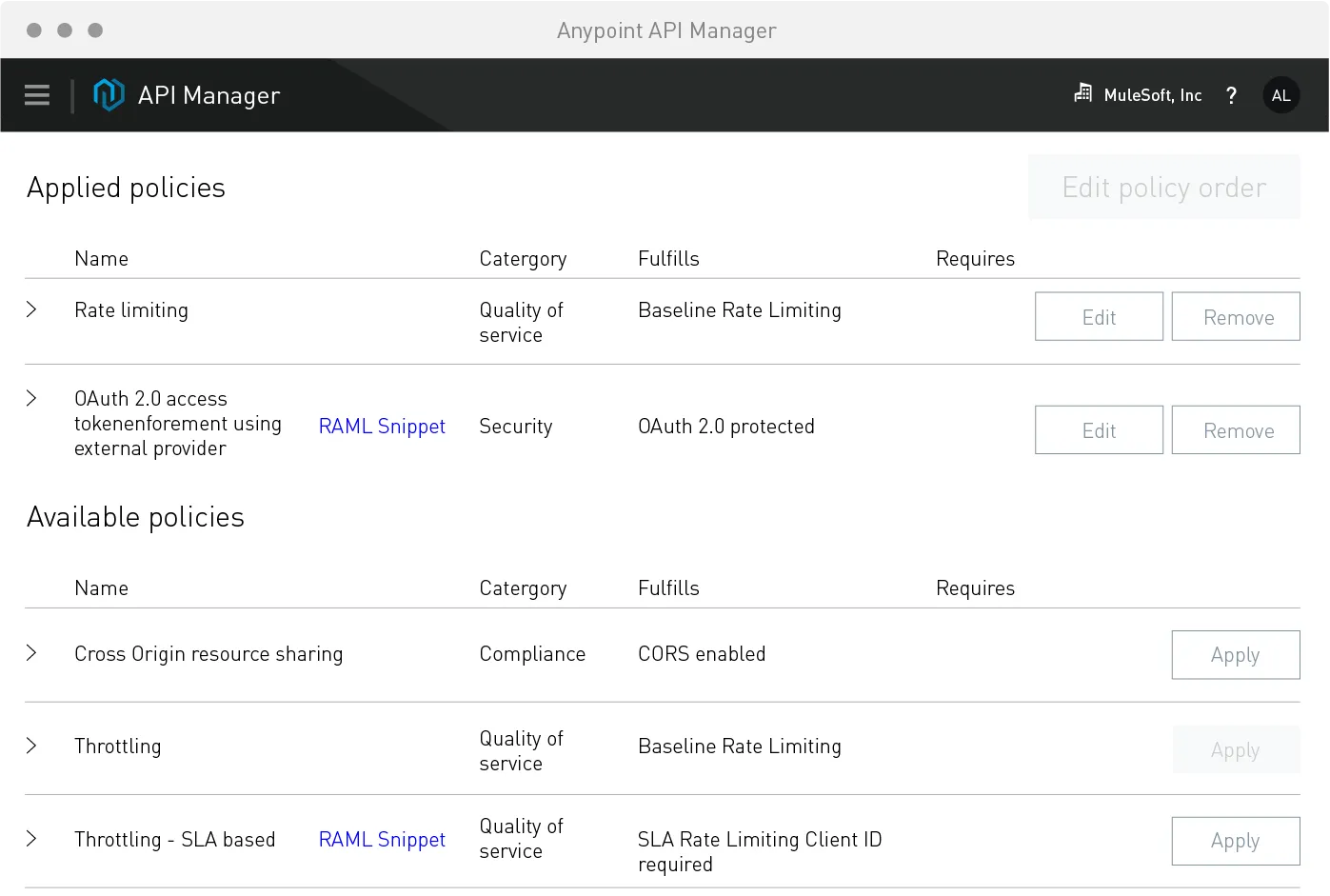
Source: MuleSoft
The MuleSoft API Management Platform assists with the operation and scalability of API infrastructure. It enables management of APIs and microservices from a single interface, enhancing productivity by allowing users to secure APIs, manage client access, group APIs as products, and obtain vital insights into their API programs.
API management features include:
- Unified API and microservice management: Manage, secure, and analyze APIs consistently from one interface.
- Flexible API gateway: Manage services securely, applying pre-built or custom security policies at runtime without downtime.
- Service mesh: Secure and governs microservices across various hosting environments, enhancing security and governance.
- Integrated access management: Manage access to your digital assets effectively, whether it involves individual users or entire teams.
- Advanced API analytics: Gain crucial insights into API reliability, performance, and compliance to optimize and safeguard your API ecosystem.
API discovery capabilities include:
The MuleSoft API Management Platform includes API autodiscovery capabilities that streamline the management of APIs through API Manager.
- API proxy configuration: Allows Mule applications to function as their own API proxies, increasing flexibility and control over API traffic and interactions.
- Single instance association: Ensures that each API in a Mule setup is associated with only one autodiscovery instance at a time, maintaining clear and manageable API tracking and management.
- Continuous monitoring: Enables continuous monitoring of APIs through the API Manager, ensuring that APIs are always up-to-date with the latest policies and are performing optimally.
2. IBM API Connect
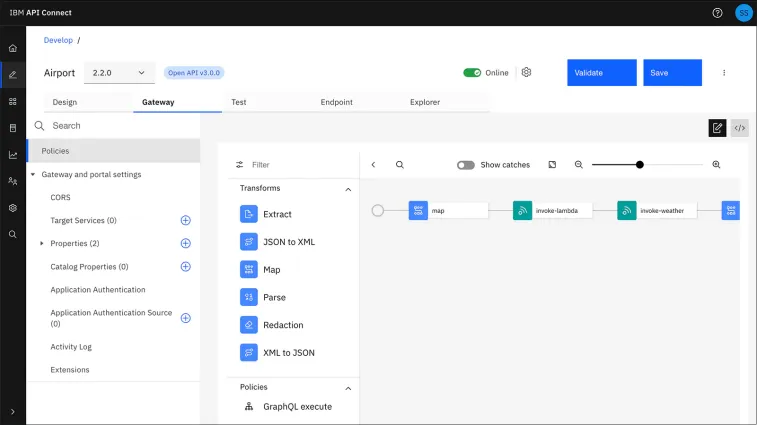
Source: IBM
IBM API Connect is a full-lifecycle API management solution designed to support the creation, management, security, and monetization of APIs across on-premises and cloud environments. The solution is available on-premises or as a fully managed service on Amazon Web Services (AWS).
API management features include:
- Full lifecycle management: Consistently create, manage, secure, socialize, and monetize APIs using an award-winning developer portal.
- Flexible deployment options: Operate IBM API Connect on cloud, on-premises, or across any hybrid environment, adapting to where your apps and data reside.
- API security: Utilize a robust API gateway to manage cybersecurity risks and protect data across multicloud environments.
- Scalable microservices architecture: Scale backend components to meet service level agreements (SLAs) and manage services more securely across all endpoints.
- Socialization features: Enable easy discovery and consumption of APIs through self-service portals, subscription tools, and forums to grow a developer community.
API discovery capabilities include:
- Traffic visibility: IBM API Connect provides enhanced visibility into enterprise network traffic, identifying unmanaged APIs, including potential shadow and zombie APIs, which helps mitigate compliance and security risks.
- Real-time analysis: The discovery service analyzes traffic logs and traces in real-time, providing up-to-date insights into API usage and configurations. This allows organizations to maintain accurate API documentation and inventory.
- Compliance and security: By discovering and documenting APIs, IBM API Connect helps ensure that all APIs adhere to governance standards, reducing the risk of security gaps associated with unmanaged or outdated APIs.
3. Azure API Management
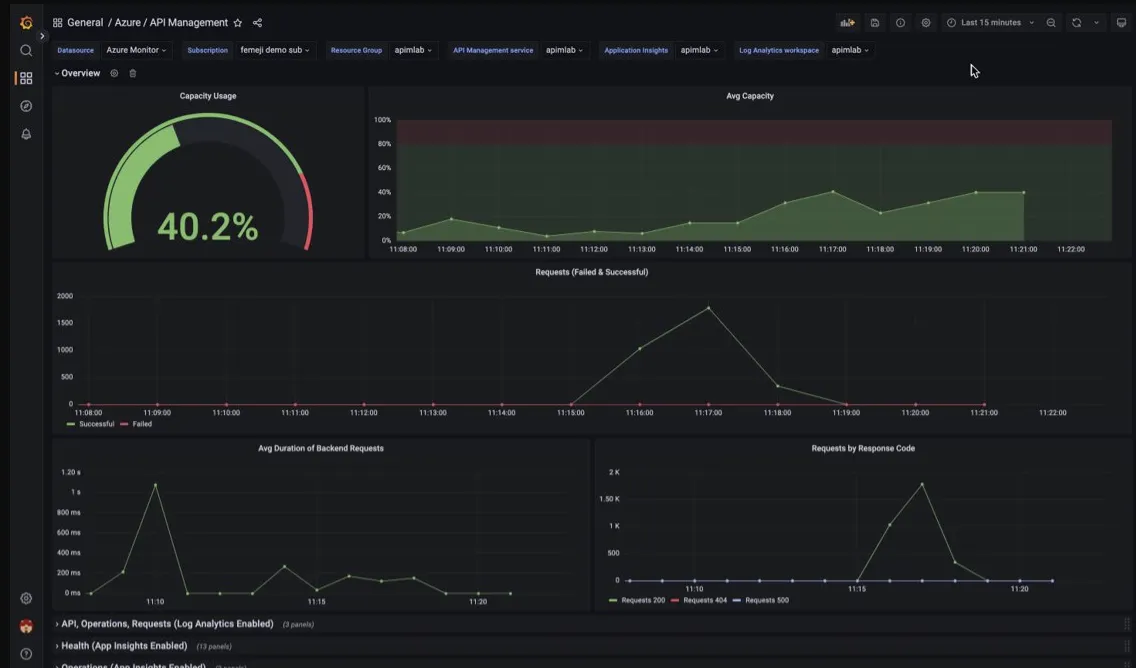
Source: Microsoft
Azure API Management is a hybrid and multicloud management platform designed to accelerate business growth by helping enterprises manage APIs across all environments. It streamlines API management tasks, offering full observability and optimizing API traffic flows for APIs hosted in Azure, other clouds, and on-premises.
API management features include:
- Unified API management: Manage all APIs from a single platform across hybrid and multicloud environments.
- Security features: Implement authentication, authorization, and usage limits to control how data and services are exposed to various stakeholders.
- Rapid application development: Accelerate app development with API-first approaches, supporting quick deployments and immediate value delivery through API mocking, revisions, versioning, and automated documentation.
- Enhanced discoverability: Utilize a customizable developer portal to enhance the management and sharing of APIs with internal teams, external partners, and customers.
- Cloud integration: Connect on-premises APIs to cloud services securely, creating a bridge that allows for safe integration of on-premises and cloud environments.
API discovery capabilities include:
- Centralized API tracking: Azure API Management’s API Center provides a unified hub to discover, track, and manage all APIs within an organization. This centralization aids in reducing fragmentation and improving API reuse, quality, and compliance.
- API inventory management: Maintains a comprehensive inventory of all APIs, regardless of type (e.g., REST, GraphQL, gRPC), lifecycle stage (e.g., development, production, deprecated), or deployment location (e.g., Azure cloud, on-premises data centers, other clouds). This ensures that all APIs are accounted for and can be managed effectively.
- Comprehensive API representation: Captures detailed information about APIs, including their versions, specifications, deployments, and deployment environments. This helps in maintaining an accurate and up-to-date record of the API landscape.
- Metadata properties: Organizes and enriches cataloged APIs with both built-in and custom metadata. This enhances governance and discoverability, ensuring that APIs are easily searchable and identifiable within the organization. The metadata schema is compatible with JSON and YAML specifications, supporting schema validation in developer tooling and automation pipelines.
4. Apigee API Management
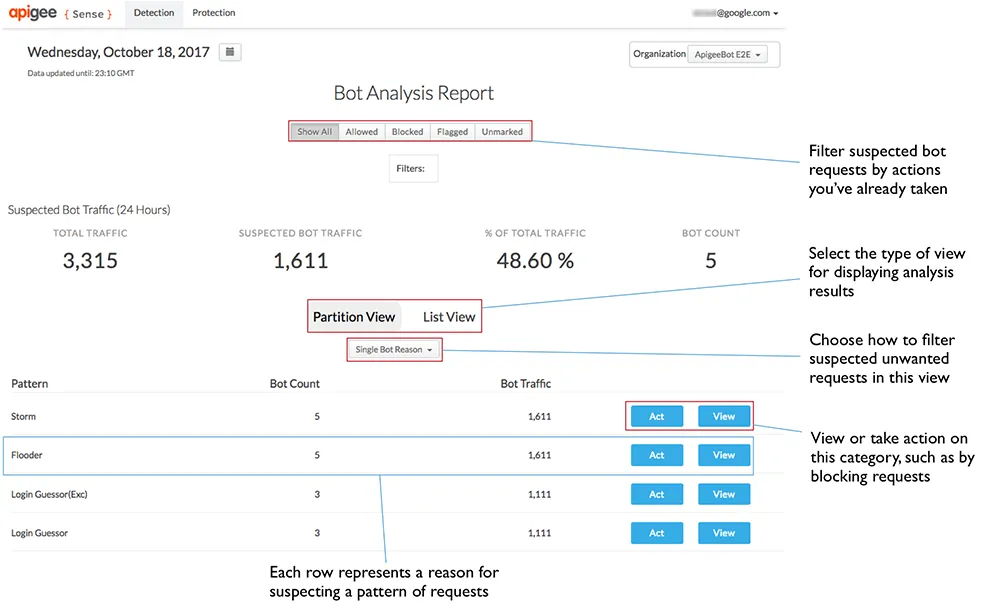
Source: Apigee
Apigee API Management from Google Cloud is a scalable, secure tool designed to manage APIs across any environment. The platform supports a wide range of architectural styles including REST, SOAP, GraphQL, and gRPC, and offers flexible pricing options to cater to different business needs. Apigee provides integrated AI/ML capabilities that enhance API security and development efficiency.
API management features include:
- Diverse architectural support: Manage and secure APIs regardless of their architectural styles—REST, SOAP, GraphQL, or gRPC—providing flexibility for all types of API implementations.
- Gemini code assist: Use AI-powered tools to accelerate API development. This feature helps in creating consistent quality APIs, generating mock servers for testing, and transforming API specifications into proxies or extensions.
- API hub: Consolidate all API specifications in a universal catalog, whether built or deployed, facilitating easy access and consistent governance across the board.
- High-performance API proxies: Orchestrate API traffic with high control and reliability, suitable for demanding applications. This includes proxying internal microservices as REST APIs to enhance security.
API discovery capabilities include:
- Centralized API hub: Consolidates and organizes all APIs of interest, providing a single source of truth for the organization’s API portfolio.
- Powerful search capabilities: Supports LLM-based free-text and filter-based searches, allowing users to find APIs based on any part of their definition or metadata.
- Dependency mapping: Models dependencies between various API operations, helping to manage relationships and troubleshoot issues within the API ecosystem.
- Apigee API proxies: Automatically fetches and registers API proxy information from Apigee projects, ensuring that the latest proxy definitions are always up to date.
5. WSO2 API Manager
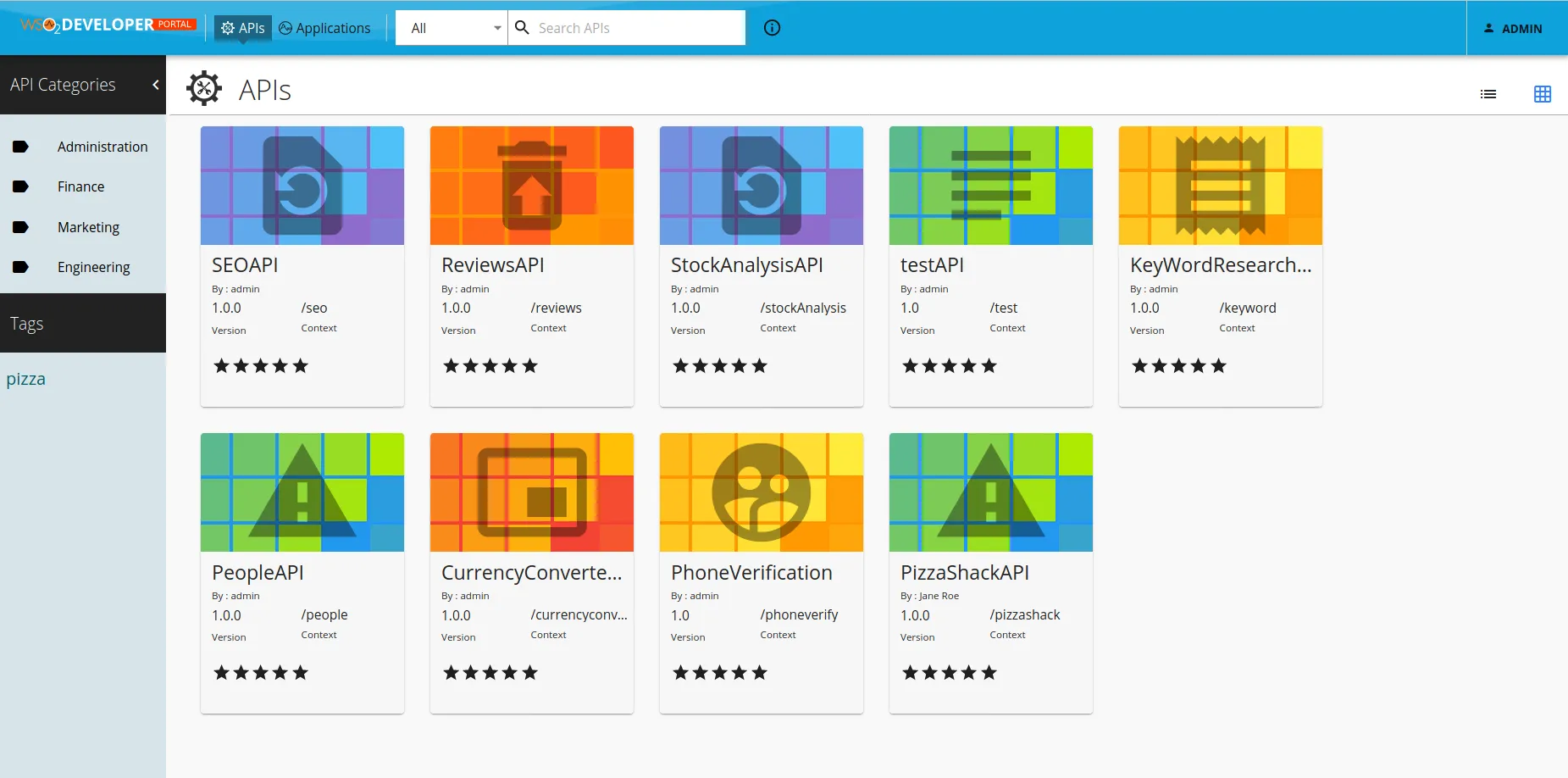
Source: WSO2
WSO2 API Manager is an open-source API management platform that supports building, integrating, securing, and exposing digital services as managed APIs. It supports a variety of deployment models including cloud, on-premises, and hybrid architectures. It aims to simplify and optimize API management across diverse business environments.
API management features include:
- Comprehensive protocol support: Seamlessly handle APIs with support for REST, GraphQL, AsyncAPIs, and more, ensuring compatibility and interoperability with various systems and standards.
- Advanced integration capabilities: Offers an integration runtime that enables composite microservices creation, message routing, transformation, and service orchestration.
- Customizable and extensible: Tailor the API management experience, from user interfaces and API lifecycles to security policies and portals, to fit specific business needs.
- Flexible deployment options: Deploy in cloud, on-premises, or hybrid settings.
API discovery capabilities include:
- API lifecycle integration: Integrates service discovery into the API lifecycle, from development to deployment, ensuring smooth transitions and updates.
- Live endpoint updates: Supports real-time updates to service endpoints, allowing the system to adapt immediately to changes in the deployment environment.
- Rich search capabilities: Provides advanced search and filtering options to quickly locate APIs based on various criteria such as metadata, tags, and lifecycle stages.
6. Boomi API Management
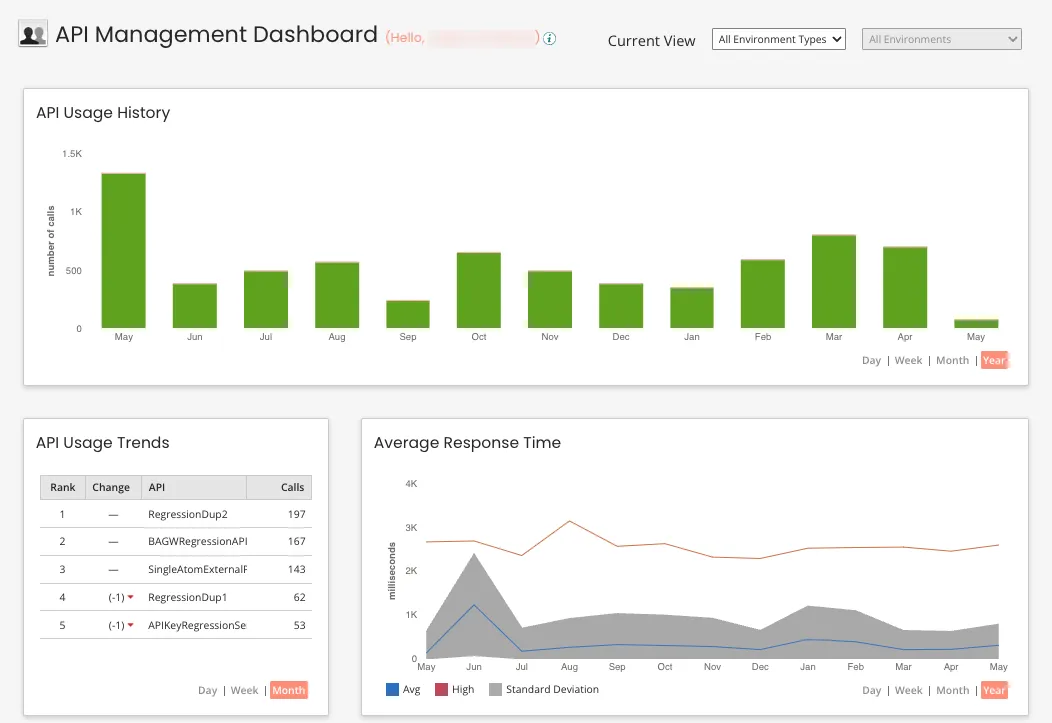
Source: Boomi
Boomi API Management offers a comprehensive solution to manage the full lifecycle of APIs across various environments, facilitating effortless configuration and exposure of real-time integrations. This platform is designed to simplify the deployment and management of APIs, enhancing data accessibility and governance through an intelligent easy-to-use interface.
API management features include:
- Full lifecycle support: Supports the entire API lifecycle, from configuration to exposure, in any environment, making it easy to manage real-time integrations.
- Data exposure and integration: Effortlessly configure and expose integrations via APIs and third-party services, making data readily available for business processes.
- Mediation and versioning: Provide an abstraction layer between the published API and the underlying integration, and manage different versions of APIs.
- Developer engagement and portal: Improve API discovery and usage across the organization with the API Developer Portal, which encourages engagement and facilitates the creation of business processes.
API discovery capabilities include:
- Intelligent UI: Boomi API Management offers an easy-to-use interface that simplifies the configuration and exposure of real-time integrations through APIs and third-party services.
- API developer portal: Features an API Developer Portal that enables the discovery and usage of APIs across the enterprise. This portal supports the development of composite applications by allowing easy access to data from existing applications, enhancing collaboration and innovation.
- Version management: Manages different API versions to ensure that business needs are met and the correct actions are executed. This feature supports the continuous discovery and updating of API versions as they evolve.
7. Nevatech Sentinet
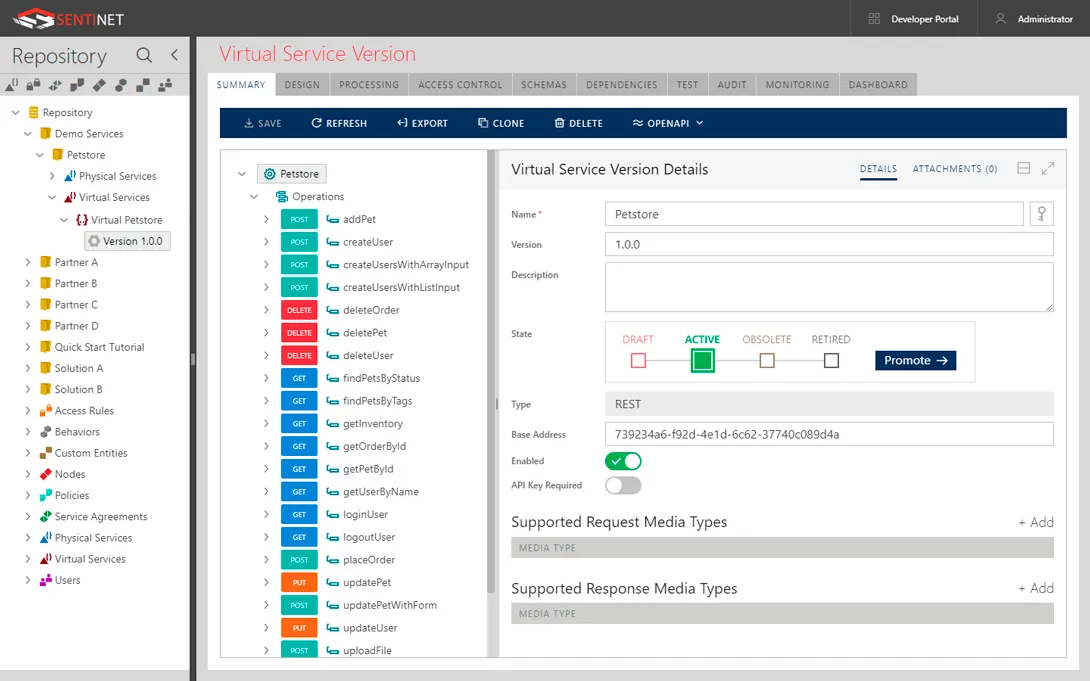
Source: Nevatech
Nevatech Sentinet is an API Management and Governance platform. It focuses on flexibility, scalability, and a lightweight design, while offering features addressing all aspects of API management, whether on-premises, in the cloud, or in hybrid environments.
API management features include:
- API repository: Features an enterprise-level API Catalog with support for API descriptions, versioning, role-based access, lifecycle management, and multi-tenancy.
- API Gateway: Provides a secure, lightweight gateway with robust runtime capabilities, supporting any type of APIs service, or microservice.
- Rich feature set: Includes security, monitoring, analytics, message transformation, routing, API discovery and description, dependency tracking, version control, SLA management, alerting, audit, and change notifications.
- Developer and partner integration: Allows developers and partners to access service and API metadata, documentation, and code samples, promoting easy integration and collaboration.
API discovery capabilities include:
- API catalog: Nevatech Sentinet allows for the discovery of SOAP services and REST APIs through its comprehensive API Catalog. This catalog helps in managing and organizing APIs within the enterprise.
- Version management: Manages the versioning and lifecycle of APIs, ensuring that different versions are tracked and maintained. This is crucial for the continuous discovery of APIs as they evolve and change.
- Advanced search capabilities: Features robust search functionalities that allow users to search the Sentinet Repository for APIs using various criteria. This facilitates quick and efficient discovery of APIs based on specific needs and parameters.
8. Teejlab API Management Platform
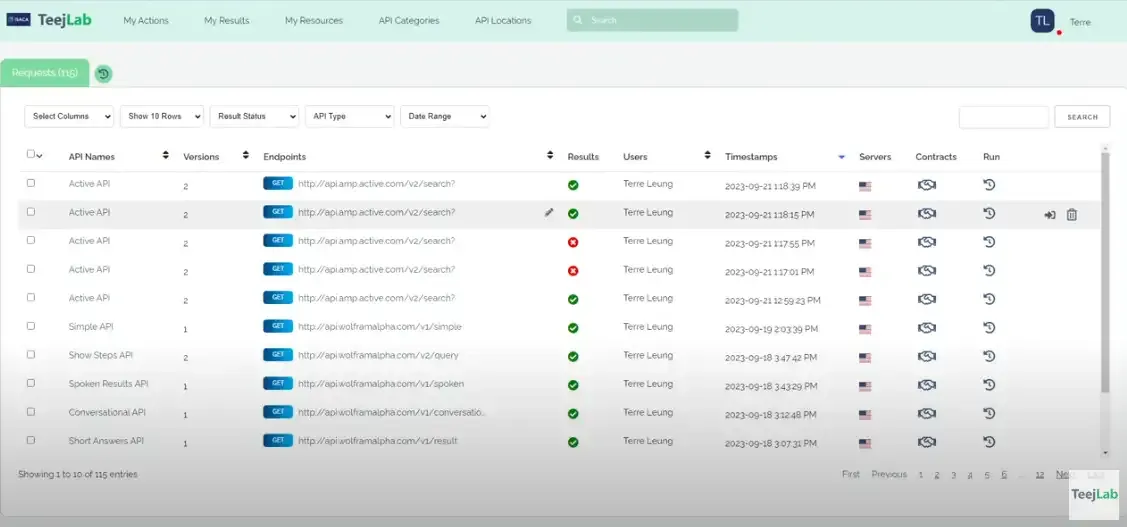
Source: Teejlab
Teejlab API Management Platform tracks APIs globally for their innovation potential and evaluates them for security, legal, and operational constraints. Teejlab hosts the world’s largest API repository, encompassing thousands of APIs from diverse industries, providing unprecedented business insights and enabling secure and compliant digital transformations.
API management features include:
- Global API tracking: Monitors APIs on a global scale to assess their innovation potential and evaluate their security, legal, and operational constraints. This helps organizations stay ahead in the rapidly evolving digital economy.
- API repository: Hosts the world’s largest API repository, with thousands of APIs from hundreds of industries. This repository provides valuable business insights and supports digital transformation initiatives by offering a wide range of API options.
- Security and compliance: Benchmarks APIs against top security frameworks like OWASP and CIS, identifying and mitigating vulnerabilities. The platform ensures APIs comply with industry standards and regulations, reducing business risks.
- API lifecycle management: Manages the entire lifecycle of APIs, from creation and deployment to versioning and retirement. This feature ensures that APIs are consistently maintained and updated as per business needs.
API discovery features include:
- Marketplace for private and public APIs: Access a vast selection of APIs, choosing based on analytics from over 15,000 APIs across more than 10,000 providers and 5,000 categories. This module supports legal risk assessment, quality checks, and data privacy analysis.
- Software composition analysis: Integrates scanning agents within CI/CD processes to discover APIs embedded in source codes, enhancing transparency, governance, and workflow management across multiple products.
- API dashboard: Provides stakeholders with high-level analytics on API usage, organizations, user activities, API hosting locations, and more, with drill-down capabilities to gain deeper insights into API consumption and billing audits.
- Dynamic discovery and management: Enables dynamic discovery of APIs through network analysis and static discovery via software repository scans, accommodating diverse enterprise environments and needs.
9. Gravitee API Management
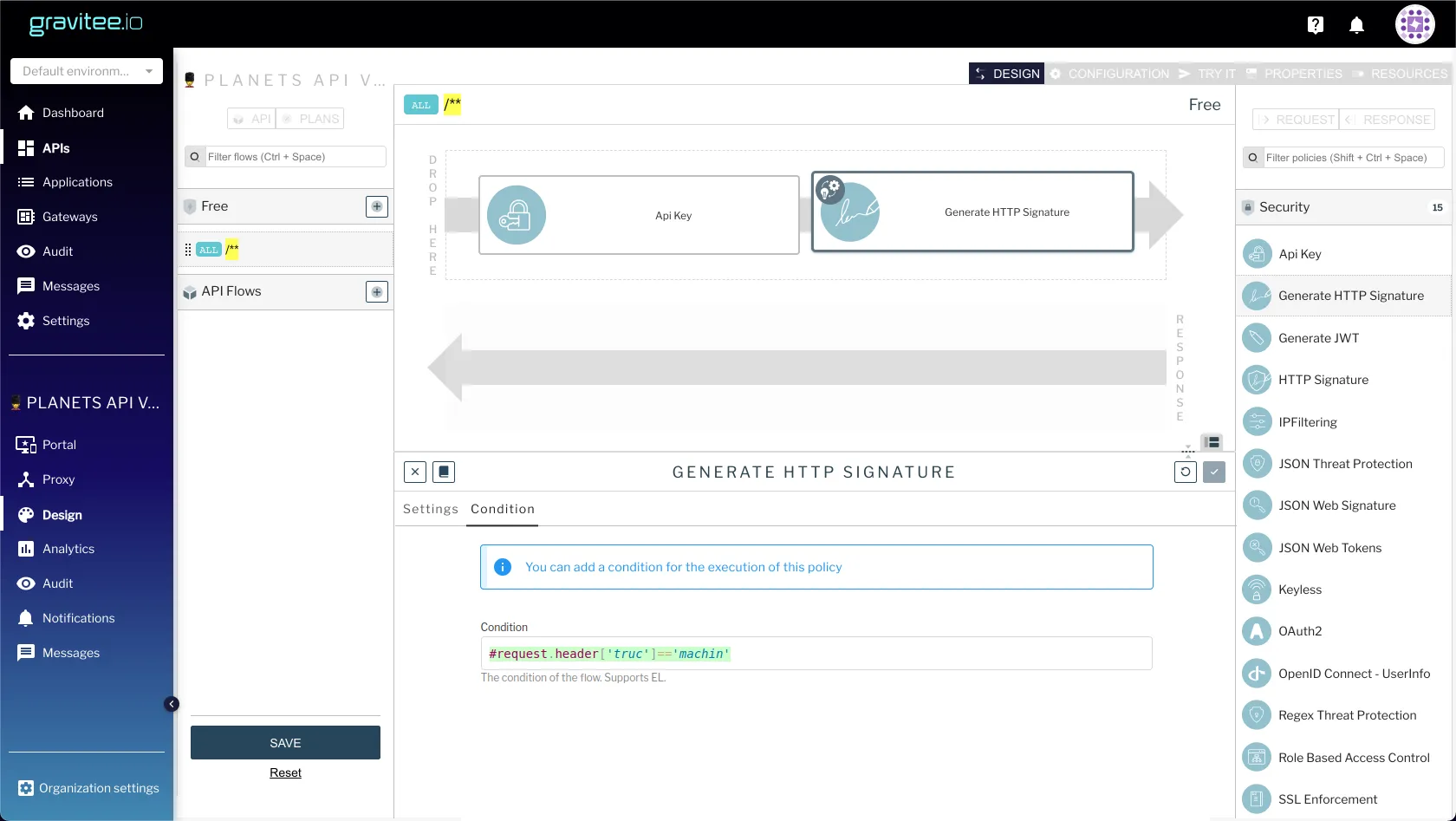
Source: Gravitee
Gravitee API Management is a high-performance, event-native API Gateway and Management solution, with a lightweight design, supporting multiple API styles and protocols. Designed to be significantly faster than other popular solutions, it provides an integrated platform for managing API traffic and policies.
API management features include:
- Highly performant API gateway: Built on Java, Gravitee’s API Gateway is optimized for speed, suitable for both synchronous and asynchronous APIs.
- Protocol mediation: Supports a wide range of API styles and protocols, including REST, Websockets, and Webhooks, and allows for easy mediation between different protocols, such as fronting a Kafka or MQTT topic.
- Developer portal: Enhance API discoverability and consumption with a comprehensive developer portal that allows for easy publication of APIs and their documentation.
- Comprehensive support features: Supports CORS, utilizes response templates to customize API responses, and allows API ratings to enhance visibility and feedback from users.
API discovery capabilities include:
- Centralized API access: Offers a single place for consumers to browse, subscribe, and request access to APIs, enhancing discoverability.
- API analytics for consumers: Allows consumers to view detailed analytics such as call locations, top APIs, response times, and more, providing visibility into API usage and performance.
- Subscription configuration: Enables the configuration of subscriptions, contracts, and security settings to manage API access and usage.
- Trending APIs: Allows consumers to view which APIs are trending globally, facilitating the discovery of popular and widely used APIs.
Tips from the Expert

Rob Gurzeev, CEO and Co-Founder of CyCognito, has led the development of offensive security solutions for both the private sector and intelligence agencies.
In my experience, here are tips that can help you better leverage API discovery tools:
- Use discovery tools to monitor API shadow IT: Many APIs exist outside formal IT governance (shadow IT). Use API discovery tools to continuously scan for undocumented APIs that may have been deployed by teams without central oversight, reducing the risk of unsecured endpoints.
- Implement API lifecycle automation: Automate the integration of API discovery with your CI/CD pipeline to ensure that newly developed APIs are automatically documented, versioned, and monitored from the moment they are deployed.
- Integrate with SIEM for real-time security insights: Enhance your API security posture by integrating API discovery tools with your Security Information and Event Management (SIEM) system, providing real-time alerts on suspicious API traffic or potential breaches.
- Optimize API performance via deep analytics: Utilize detailed analytics from discovery tools not just for security but also to optimize API performance by identifying bottlenecks or underutilized resources, leading to more efficient API management.
- Integrate with external threat intelligence: Enhance your API discovery capabilities by integrating with external threat intelligence feeds. This allows your tools to cross-reference discovered APIs with known vulnerability databases, improving overall security response.
These advanced strategies will help you maximize the value of API discovery tools, ensuring a more secure, compliant, and efficient API ecosystem.
API Security with CyCognito
CyCognito is an exposure management platform that reduces risk by discovering, testing and prioritizing security issues. The platform scans billions of websites, cloud applications and APIs and uses advanced AI to identify the most critical risks and guide remediation.
Emerging companies, government agencies and Fortune 500 organizations rely on CyCognito to secure and protect from growing threats.
Want to see how it works?
- Check out our website and explore our platform with a self-guided, interactive dashboard product tour.
- To learn how CyCognito can help you understand your external attack surface and exposed risks, please visit our Contact Us page to schedule a demo.

2024 State of Web Application Security Testing
Are you confident your web application security measures are keeping pace with evolving threats?
Discover how your web app security compares. Learn about average testing frequency, the prevalence of web application security incidents and breaches, and the increasing adoption of automation to improve testing efficiency.














